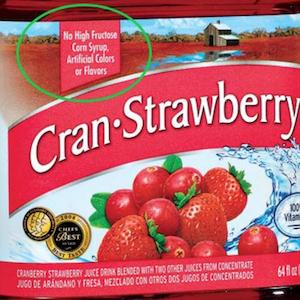Ocean Spray, the company that makes several popular cranberry juice drinks, is battling a class-action lawsuit brought by two plaintiffs who claim to be representing just about every living, breathing human in the United States1.
Filed in Massachusetts, the lawsuit accuses Ocean Spray of committing fraud, negligent misrepresentation (of its product), breach of warranty, and unjust enrichment. In other words, Ocean Spray is the Bernie Madoff of cranberry juice. What evil thing has it done to deserve this? According to the plaintiffs, Ocean Spray uses artificial flavors, even though the front of its packaging explicitly states otherwise.
The crux of the lawsuit revolves around malic acid, one of the chemicals that makes green apples sour. In nature, malic acid only exists in one form, known as L-malic acid. Its mirror image, called D-malic acid, is not found in nature2. When it's chemically synthesized in the laboratory, malic acid is made as a 50/50 mixture of its D and L forms. Unfortunately for Ocean Spray, adding commercially produced malic acid to its drink means that it's technically not natural; the D form is not made by plants.
Plaintiffs Want a Big Bag of Money
Does this matter in any relevant way? No. About 99% of the vanilla in the world is at least partially synthesized; there simply isn't enough natural vanilla to flavor all the cookies and ice cream we consume. So, chemists have to make it. Similarly, about 70,000 metric tons of malic acid are made every year for use in all sorts of products.
There are zero safety issues. The 50/50 synthesized form of malic acid has been known to be completely safe for a very long time. (A paper published in 1969 showed that rats metabolized L-malic acid and the D/L mixture equally.) Furthermore, the FDA says that malic acid is a safe additive3.
So, what's the lawsuit based on? That technicality mentioned above. Although D- and L-malic acid molecules are basically the same thing (from your body's viewpoint), the D-form is not natural4. The plaintiffs claim that (1) the FDA defines anything as "artificial" if it is not derived from food products, and (2) commercially produced malic acid is made from petroleum.
Therefore, the plaintiffs claim that Ocean Spray lied about not using artificial flavors, and the only restitution is for the company to hand over a big bag of money. How big? Very big. They want a jury to award them "statutory, compensatory, treble, and punitive damages" -- all due to a technicality that hasn't affected their lives one iota.
The Insanity of the "Artificial vs. Natural" Debate
This lawsuit is yet another example of the insanity of the "artificial vs. natural" debate. Pretty much anything we find in nature can be replicated in the laboratory. That doesn't mean the synthesized product is no longer natural. And since, in this case, the D and L forms of the molecule are (essentially) identical, then recognizing one form as natural and the other as synthetic is a distinction without a difference.
The laws discriminating artificial from natural products should be scrapped and this lawsuit dismissed. The plaintiffs should also be punished by being forced to sit through two semesters of organic chemistry.
If you liked this piece, please consider donating to support our work. Happy Holidays!
Notes
(1) Except for people who live in California. I have no idea why, but I'd really like to know.
(2) Dr. Josh Bloom has written an excellent article explaining the chemistry of "mirror image" molecules and their relevance to pharmaceutical drugs. He also wrote a book on natural and artificial flavors.
(3) The technical term is "generally recognized as safe (GRAS)".
(4) In almost all cases, D and L forms behave differently in the body, but malic acid is an exception.




